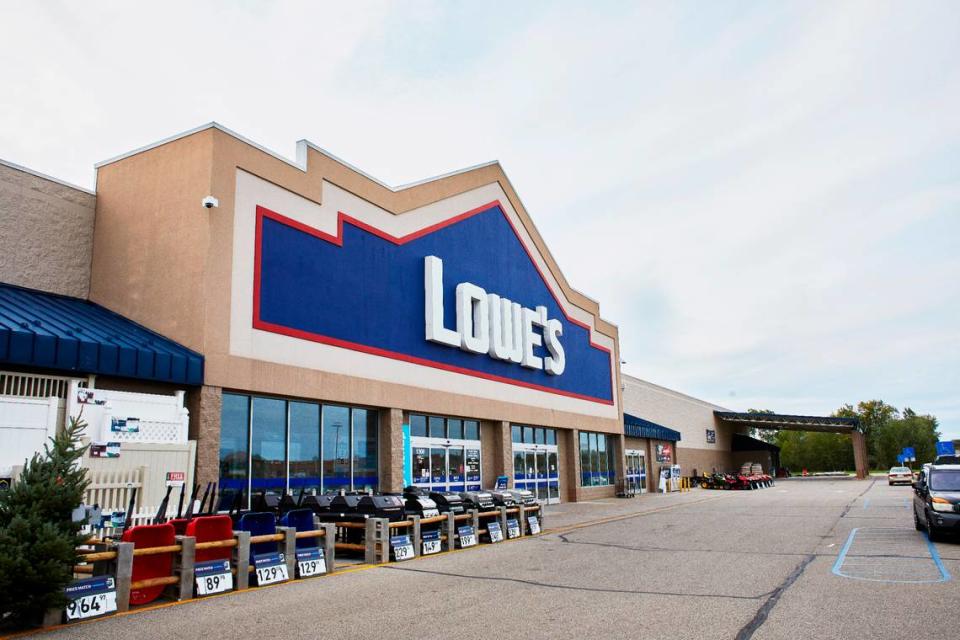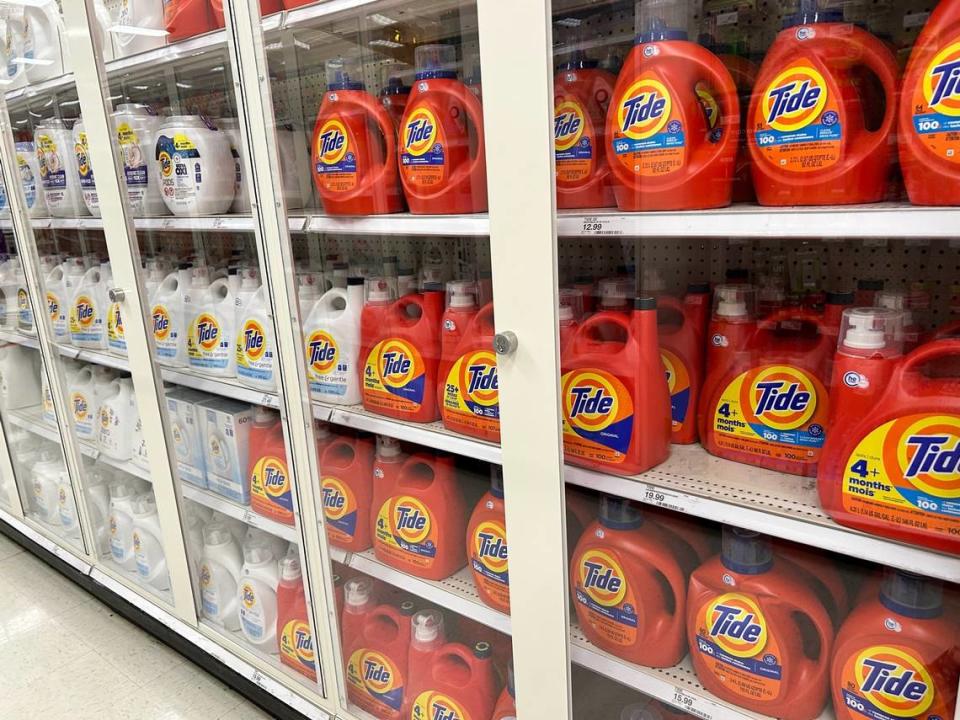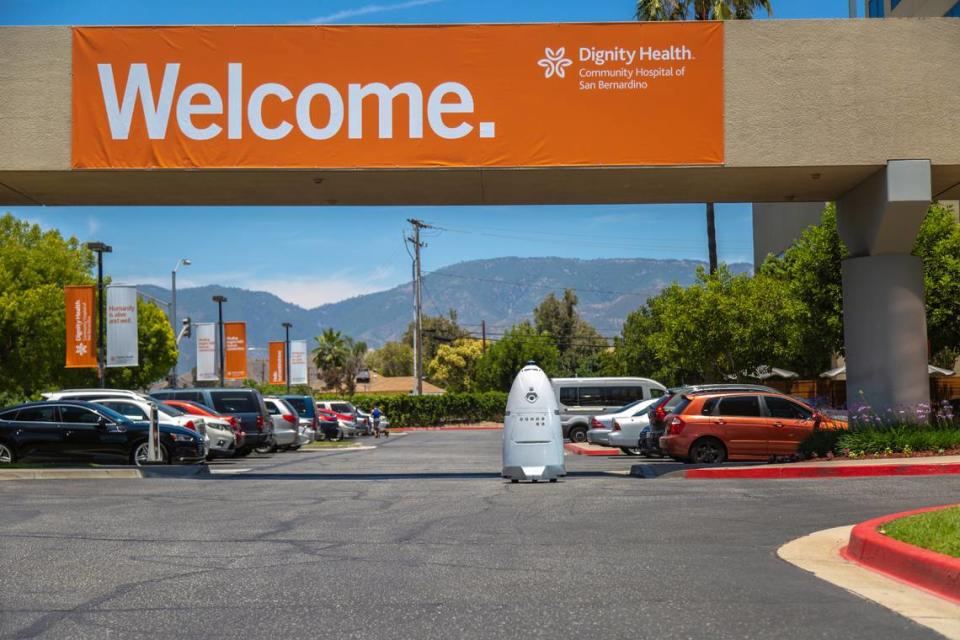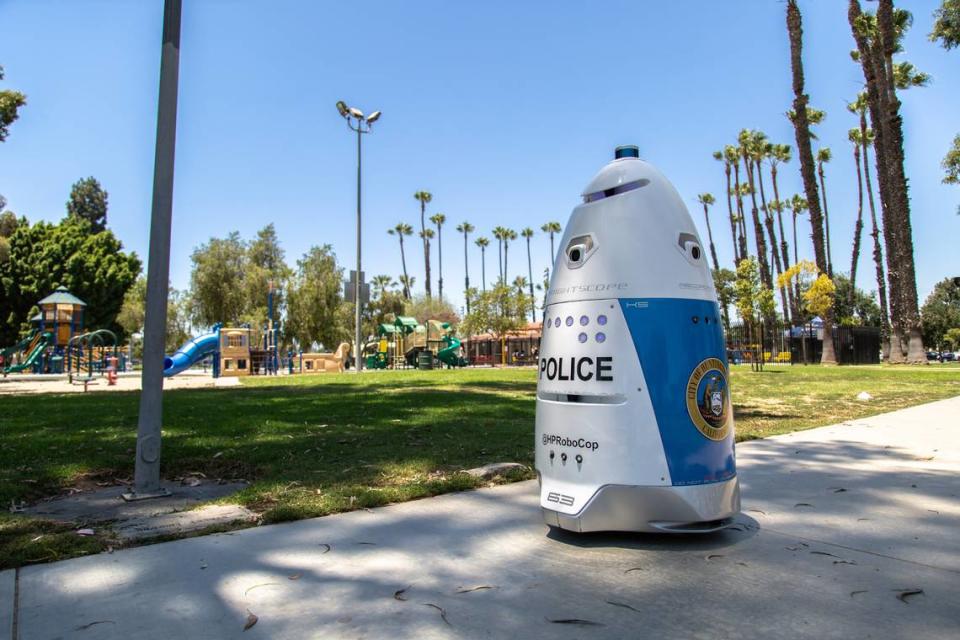Tougher laws and robot security guards. How NC is fighting rise in organized retail theft
In September 2021, Cabarrus County deputies descended on a wooded neighborhood in Harrisburg on Valhalla Drive.
Their target was a one-story, suburban Charlotte house partly hidden from the street by large trees, the home of husband and wife Bonifacio Silvas and Irma Hernandez.
When authorities entered their basement, they said they found what they were looking for — piles and piles of stolen merchandise from Lowe’s home improvement and other Cabarrus County and Charlotte-region stores. Small walking paths separated floor-to-ceiling stacks of new in-box power tools, small home appliances, diapers, baby formula, laundry detergent and outdoor power equipment.
There even was a slide built between the first floor and the basement to facilitate moving the stolen items, authorities said.
Hernandez, 49, and Silvas, 40, were arrested. The merchandise was loaded into three 26-foot U-Haul trucks, and it took 50 people over 12 hours to move and sort them all, according to the county sheriff’s office. They ultimately uncovered over $1 million worth of stolen goods, authorities said.
For Cabarrus County District Attorney Ashlie Shanley, the case was the largest bust in her career. But organized retail theft is happening across the region, state and country, she said.
Stolen merchandise cost North Carolina businesses more than $3 billion in 2021, according to the North Carolina Retail Merchants Association. Shanley has seen a steady increase in these kinds of organized retail theft rings over her 25 years working in the criminal justice system.
She handles cases ranging from outlet giant Concord Mills to small mom-and-pop stores. But now Shanley’s in a position to influence how organized retail crime is handled at a national level.
This summer, Shanley was appointed to chair the National Organized Retail Crime Advisory Board. Created last year by the Retail Industry Leaders Association and the National District Attorneys Association, the board works to promote improvements in retail security.
Organized retail crime is different from a teen shoplifting at Target, or a mother stealing baby formula because she can’t afford it, Shanley said. Thieves make a living out of it.
“The advisory board ensures that our members, which are other retail organizations, our prosecutors, our community, understand what’s happening,” Shanley said. “Because organized retail theft looks the same all over the country.”

Cracking the Harrisburg case
In Harrisburg, Hernandez and Silvas were selling the stolen goods that at least several others had stolen for them, Cabarrus County Deputy Sheriff Joe Calabro said.
That’s how organized retail crime typically works. One group boosts the items, then delivers them to others in their network who fence them.
Hernandez and Silvas listed hundreds of new tools for below market price on their Facebook marketplace accounts. Lowe’s loss prevention employees used those listings to identify what was swiped from their stores, and Calabro said he found Hernandez and Silvas’ location through their Facebook accounts.
The pandemic led to an increase in usage of online marketplaces, said Andy Ellen, president of the North Carolina Retail Merchants Association. Instead of going to physical, unregulated sites like flea markets to sell stolen items, people could simply do it from their homes now.
One potential sign of stolen goods is if someone lists several unused, boxed items for sale, Calabro said.
Although authorities identified over $1 million worth of stolen merchandise in the Harrisburg basement, Hernandez and Silvas were charged in connection with much lower amounts because it was unclear where and when many of the items were taken, Cabarrus Assistant District Attorney Brent Cole said.
They did learn, however, that the merchandise was stolen from Lowe’s, Home Depot, Target, Harbor Freight and Harris Teeter stores in Cabarrus County and surrounding areas, Shanley said.

Walking out the door with stolen merchandise
At least three people reporting to Hernandez and Silvas would fill shopping carts with small but expensive items like power tools, then simply roll them out of home improvement and other stores, authorities said.
For safety reasons, many stores direct their employees not to get involved if they see a theft taking place. That could account for some of the group’s success around Cabarrus County. Hernandez and Silvas said they had been running their operation for about a year, according to the sheriff’s office.
Hernandez was found guilty in January 2022 of possession of stolen goods valued over $100,000 and organized retail theft of over $20,000, court records show. Silvas also was found guilty of two counts of organized retail theft, one of over $20,000 and one of over $1,500.
Hernandez and Silvas served about nine months in Cabarrus County jail and both are on parole until July 2024.
At least two others associated with the Harrisburg ring, Lakevis Maloye, 51, and Jermaine Walls, 30, both from Mecklenburg County, also served time in jail for the case, court records show.

‘If they really want it, they’re gonna get it’
Although organized retail crime is receiving increased media attention, it’s not a new problem. But it’s getting worse, said National District Attorneys Association Executive Director Nelson Bunn.
Stores have seen a 26% increase in organized retail crime incidents nationwide from 2020 to 2021, he said. The National Retail Federation reported that losses from organized retail crime jumped from $90 billion in 2020 to over $94 billion the following year.
Such crimes impact customers too. Businesses raise prices to make up for “shrinkage,” or loss of inventory, Calabro said. Retailers lost $230 million to organized retail theft in North Carolina in 2021, according to the North Carolina Retail Merchants Association.
Even keeping merchandise behind locked cases doesn’t always work.
In a 2022 case involving multiple counties around Charlotte, a man peeked over the shoulders of Lowe’s employees to learn the lock combination then unlocked the merchandise and took what he wanted, Calabro said. The suspect was charged with two counts of organized retail theft of over $20,000.
“If they really want it, they’re gonna get it,” Calabro said.

Turning to robots to deter retail thieves
Thieves often target home improvement chains like Lowe’s and Home Depot because of their small items with high value, said Ellen with the NC Retail Merchants Association.
In the 2022 fiscal year, Lowe’s lost $997 million to “shrink” — merchandise lost to retail crime as well as other factors like damage from weather-related issues, CNBC reported on Friday, Sept. 8. That fiscal year’s total shrink was a 25% increase from the $796 million the company said it had in 2021.
The home improvement store took an unusual step to try to thwart such crimes — autonomous robots..

In March, the Mooresville-based company began using 400-pound security robots in select stores as a pilot program, Lowe’s spokesman Larry Costello told The Charlotte Observer. Those robots, made by Silicon Valley-based Knightscope, are in Lowe’s stores in the Charlotte area, Costello said.
Lowe’s wants to prioritize using technology to enhance its efforts against retail theft, as well as be proactive with customer service and asset protection, Costello said in an email.
How the security robots work
Knightscope’s robots can be stationary or move on their own, said Stacy Stephens, the company’s executive vice president.
Stationary robots use facial recognition technology that can locate individuals a retailer puts on a watch list if they have stolen from the store before. The mobile robots record 360-degree video and say pre-programmed messages, such as welcoming visitors or telling someone they need to leave and that security has been notified.
The robots also can detect and log a serial number attributed to individual cell phones, which already has been used to catch a shoplifter in California, Stephens said.
Three people robbed a luxury store in a California mall, and Knightscope robots were able to record the thieves roaming the mall before the crime. Using information from their cell phones, the robot alerted security when one of the thieves returned to the mall, and police arrested him, Stephens said.
Logging shoppers’ cell phone serial numbers is a legal way for the robots to identify who comes in and out of the store, Stephens said.
This kind of tracking can be controversial because of privacy concerns, according to Retail Dive, although the tracking was initially used as a marketing tool to detect repeat shoppers. As a security measure, it sends an alert to stores when a known thief’s cell phone serial number is present.
Just the robots’ presence can be enough to deter some would-be criminals, Stephens said. “Having a five-and-a-half-foot tall, three-foot wide, 400-pound robot rolling in front of you gets your attention really fast,” he said.
Instead of fearing the robots, Stephens said most people are entertained and take selfies with them. But In Philadelphia Lowe’s stores where they also are in use, some people are calling them “snitchBOTS,” the Philadelphia Inquirer reported.
There also have been occasional problems with the robots. One Knightscope robot “drowned” in a Washington D.C. pool, and another got “fired” for roaming off private property and onto the sidewalk in San Francisco, according to published reports.

Employee safety during retail thefts
Despite attempts at enhanced security, violence related to retail theft remains a concern.
Last year in Hillsborough, for instance, a Home Depot worker died after being pushed to the ground by a shoplifter. “We’ve just seen that they’ve become more brazen and more aggressive than they have in the past,” Ellen said.
A national study by the Retail Industry Leaders Association and the Buy Safe America Coalition found that 76% of retailers surveyed said an organized retail crime thief assaulted one of their employees.
And a recent Loss Prevention Magazine survey found that 60% of retail employees saw some type of violence while at work over the past year, TheStreet financial news reported. TheStreet also reported that an Atlanta Walmart, which had closed down following a suspect arson, intends to reopen — with a police substation in it.
The increase in violence impacts the way people shop too. “You’re attacking almost a way of life,” Cole said, “not just the business owners.”
Other big retail theft cases
The $1 million worth of stolen goods found in the Harrisburg home was hardly an isolated incident.
Last November, a Kings Mountain man was caught selling stolen merchandise, working with dozens of thieves who stole $5 million worth of over-the-counter medication from CVS, Walgreens, Walmart and Target stores in the Charlotte area, WCNC reported.
These types of cases also go beyond North Carolina.
In August, a pastor in St. Petersburg, Florida, led a retail theft ring, stealing $1.4 million from Home Depot, the Miami Herald reported. The stolen goods were sold on the pastor’s eBay account under the username, “Anointed Liquidator.”
Changing retail theft laws
Given the scope of organized retail theft, state and federal lawmakers are working to strengthen laws dealing with such crimes.
In January, a bill introduced in Congress would establish an Organized Retail Crime Coordination Center at Homeland Security to help further investigate organized retail crime rings.
Meanwhile, a new law in North Carolina will increase potential jail time for organized retail crime rings. In December, state legislators passed the “Organized Retail Theft” bill, which allows prosecutors to combine the value of stolen goods across county lines, allowing for more serious felony charges.
It’s the difference between putting someone in jail for about three years, or more than 19 years, Cabarrus County GOP Rep. Kevin Crutchfield said.

Another bill, this one sponsored by Crutchfield, would allow for harsher sentencing if the merchandise is from an organized retail crime ring. The bill passed the House but has yet to be voted on in the state Senate.
“When I walk into a Lowe’s store and I see someone grab something and turn around and walk out, and they get away with it, I know it’s because there’s not enough beef behind the law to prosecute that crime,” Crutchfield said.
This bill will help prosecutors stop repeat offenders, Ellen said. “You would see the same person that stole from you yesterday back in your store today,” he said.
Meanwhile, prosecutors and retailers intend to keep shedding light on the problem.
In her position on the Retail Crime Advisory Board, Shanley aims to use her experience in Cabarrus County to educate the public about organized retail crime.
“There’s so many who don’t know that this is happening,” she said. “And if you don’t know, you’re gonna be a victim.”

